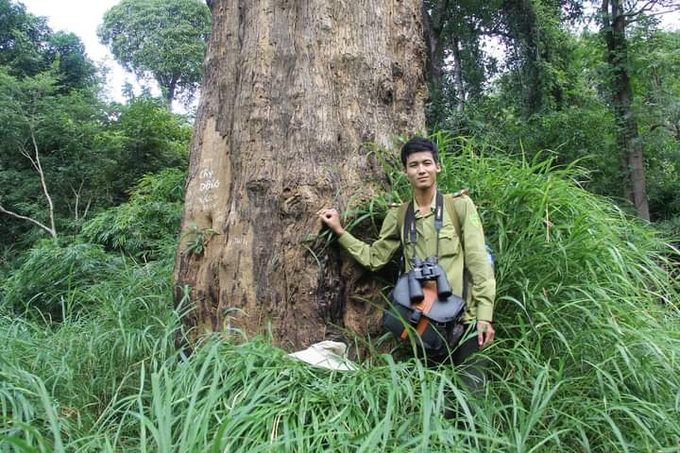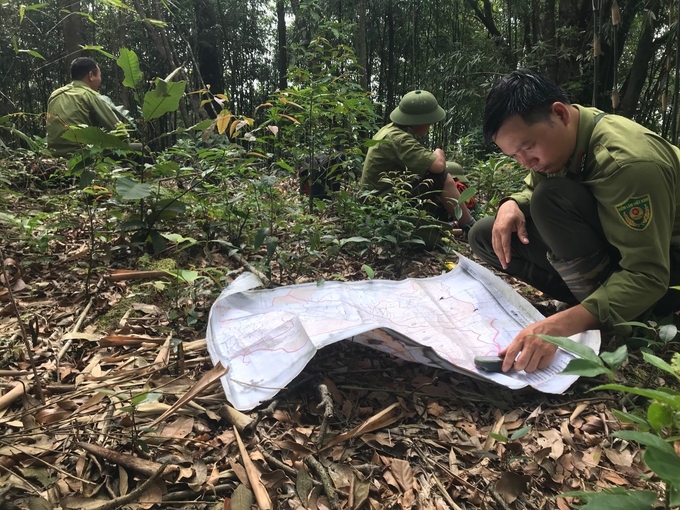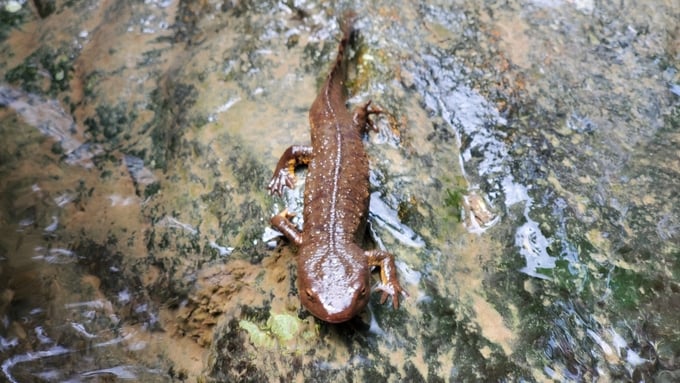May 17, 2025 | 22:16 GMT +7
May 17, 2025 | 22:16 GMT +7
Hotline: 0913.378.918
May 17, 2025 | 22:16 GMT +7
Hotline: 0913.378.918

Forest ranger Pham Duc Huy with a forest kit including a camera and binoculars.
The first time I met Mr. Pham Duc Huy, he appeared to be the true soldier of Uncle Ho, who once saved the nation by rippling across the Truong Son Mountain range. The one thing that stands out should be the camera he carries along throughout the whole trip.
The bag is sized to accommodate a camera, a few accessories such as cables, adapters, and spare batteries, as well as a large raincoat. Thanks to this raincoat, his "tech friend" has endured dozens of forest downpours, according to Huy. Aside from his raincoat, most of Huy's personal belongings were left at the ranger station when he spent a week searching for photographs by wading, climbing, and crossing streams. The man born in 1989 chuckled and stated that humans can continue regardless of getting wet, but his devices may compel him to return if they get wet.
The journey back was also difficult. According to Huy, Tam Dao National Park is approximately 35,000 hectares, and each ranger is responsible for managing nearly 1,000 hectares. Numerous patrols must follow the ravine and descend the cliff face. It appears to be a short distance when viewed from above, but it takes half a day to get there. The side camera bag occasionally dangles and could strike the ancient trees tens of meters height at any moment if attention is not taken. Not to mention, it will be challenging to guarantee the work's progress if a ranger halts midway. Therefore, Huy guards the camera case with care.
The bag's hue has diminished after traveling with Huy since the day he secured the forest in Yok Don National Park. For a typical photographer, he must have found a new companion, but the ranger born in Vinh Phuc is unique. The camera is a confidant, assisting him in overcoming months of adversity on his patrol route. Huy, unsure of what to do while waiting for morning, took out his luggage to examine it, then, as was usual, he took out his camera and photographed the night sky.

Forest rangers on duty in Tam Dao National Park. Photo: Tung Dinh.
In the fairy tale "The Little Match Girl" by Hans Christian Andersen, every time she fanned the flame she saw a shining reverie. There are no matches, but every time Pham Duc Huy looks through the viewfinder of his camera at the sky, trees, and forest canopy, he seems to fall in love with the evergreen broadleaf forest. Even though the shoulders are weary from carrying over ten kilograms of equipment and machinery, the legs are aching from dozens of kilometers of forest roads, and the wounds on the young skin are regenerating, they all give way to the desire to preserve every natural moment. It could be the three high mountains that represent Tam Dao, Thach Ban (1,388m), Thien Thi (1,375m), and Phu Nghia (1,400m) ascending above the sea of clouds, or it could be the dragonfly's wings flapping by the creek.
Ask Huy, what he loves more, the forest or photography, and the young ranger replied, "My house is right on the side of a mountain, and ever since I was a child, I have seen a lot of trees and forests. Wherever I go, I feel nostalgic and comfortable with the familiar blue color." Huy halted his speech and peered down at his shoulder bag as if he were about to continue. The camera that had survived many wet and dry seasons abruptly slipped from the officer's grasp, reminding him of a blossoming romance.
It took the young father of two children to describe the overflowing affection: "Love the forest like one-sided love, there is something worshiping, anxious, and unnecessary to return." "And photography as a romantic partner. How much I ascend the pass and wade through streams, take stunning photographs, and encounter unusual and poisonous species will compensate for everything."
The salamander, whose scientific name is Paramesotriton deloustali, is one of Tam Dao National Park's endemic species. Water geckos, flower-bellied toad fish, and flower-bellied newts are common names for the inhabitants of this area.
The Tam Dao salamander is a diversely characterized amphibian. It is not related to reptiles, despite their lizard-like bodies: the body is long and slightly flattened from the top down, the tail is slightly rounded and long flattened on the sides, and the skin has many rough bumps that grow along the sides to the bottom of the tail. This part is responsible for mucus secretion in its fundamental roles.
The back of the Tam Dao salamander is dark gray, while the abdomen has a layer of scarlet that appears colorful and is interwoven with dark gray lines that connect like a net. This animal's cranium is slightly depressed, with a wide muzzle, bulging eyes, and movable eyelids. The adult measure is approximately 15 centimeters.
To locate the Tam Dao salamander, an uncommon species, we had to ascend by cable car to Tay Thien Pagoda, then descend a few kilometers to the Silver Waterfall stream. Pham Duc Huy enthusiastically described the characteristics of this species en route. According to him, they are called "fish" because the front body has two protruding parts that assist in movement, and the body has fins and a fish-like tail. In water, the Tam Dao salamander typically swims primarily by its tail with its legs attaching close to the body. They walk on four legs in the terrestrial environment.

A Tam Dao salamander in Tam Dao stream. Photo: Bao Thang.
When we arrived at the stream, we were somewhat saddened because we knew that the spawning season had ended. Tam Dao salamander will be difficult to find. Under glistening water, male fish can still be identified by a bright blue stripe extending along the red-orange tail border, even if they arrive a few months early.
In addition to his interest, Huy is anxious to locate a salamander, but due to his lack of expertise a few days ago, he was unable to photograph their aquatic existence. This time, the 34-year-old ranger purchased several thin, durable white plastic bags, then gave us each one and instructed us to pack our cameras. Upon completion, he cautiously heated plastic sacks with a lighter. Possibly because they have pondered this method for a long time, the Tam Dao National Park personnel allowed little extra air inside. When we placed the equipment in the stream, we were still able to readily shoot and capture.
Tam Dao salamanders are omnivorous, consuming everything from vegetation and frog embryos to small insects, worms, and other invertebrates in the environment.
I counted while standing next to a photographer who meticulously worked like a jeweler, then became ecstatic upon discovering a salamander lurking beneath the 14th stone, which we had spotted. It nested in the vegetation and raised its eyes as if to investigate what these individuals were doing.
The salamander conceals itself similarly to a person who can "walk between raindrops." After discovering this animal, we struggled for nearly two hours to take photographs. Sometimes it descends deep into the streambed, and other times it swims into the shelter with its tail wagging.
Translated by Linh Linh

(VAN) Hue City rigorously enforces regulations regarding marine fishing and resource exploitation, with a particular emphasis on the monitoring of fishing vessels to prevent illegal, unreported, and unregulated (IUU) fishing.

(VAN) Hanoi People's Committee has issued a plan on reducing greenhouse gas emissions in the waste management sector with 2030 vision.

(VAN) Vietnam's draft amendment to Decree No. 156 proposes a mechanism for medicinal herb farming under forest canopies, linking economic development to population retention and the sustainable protection and development of forests.

(VAN) In reality, many craft village models combined with tourism in Son La have proven effective, bringing significant economic benefits to rural communities.

(VAN) The international conference titled Carbon Market: International experiences and recommendations for Vietnam was successfully held recently in Ho Chi Minh City.

(VAN) According to the Project on rearranging provincial and communal administrative units, in 2025, the country will have 34 provinces/cities, 3,321 communes, wards, and special zones, and no district-level organization.

(VAN) The vice president of fertilizer with Stone X Group says the Trump administration’s tariffs are impacting fertilizer markets.